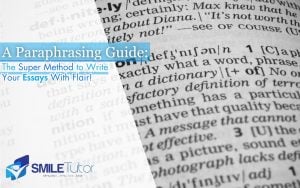
Every student struggles with writing at some point in their lives.
No matter your proficiency, no matter what stage of education you’re at— There is no end to the mastery of English.
And language mastery is key to essay writing. For many who’s not good at the language, it can feel like a lost cause. Where do I even begin?
Well, how about learning how to paraphrase?
There’s over 170,000 words being used in English, and paraphrasing just a couple of them is one way to take your writing to newer heights!
So ready for a cram lesson on paraphrasing? Let’s begin!
What is Paraphrasing?
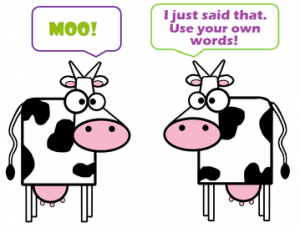
[Virtual Library]
In simple terms, paraphrasing is the act of changing one or many words to express their meaning more clearly.
Let’s give an example.
Susan went to the supermarket and bought fruits, vegetables and poultry according to her mother’s instructions.
A paraphrased sentence would become:
Susan went out and purchased groceries for her mother.
Doesn’t it sound better?
Why Should You Paraphrase?

[Freepik]
According to the Oxford English Dictionary, we have over 170,000 words being used daily! As you go through your years as a student, you’ll likely only see a fraction of this amount.
It’s always good to find words and phrases that can condense the intentions and meanings of whole sentences and paragraphs. In the context of essay writing, we want to see more substance with our words.
Yes, paraphrasing allows our essays to be more straight-to-the-point, and lets you demonstrate your understanding and interpretation of major ideas and or concepts of a given topic.
Also, paraphrasing helps to avoid plagiarism!
Schools have adapted to students procuring their information online, and have started utilising plagiarism checking tools to sniff out any traces of academic dishonesty. Tools like Turnitin, Plagaware and Grammarly are a few examples of these.
So, how do you start? Where do I begin learning how to paraphrase?
Creating a Word Bank: Synonyms
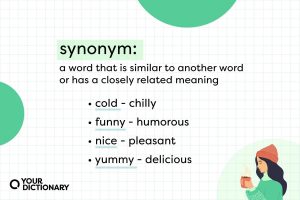
[Your Dictionary]
Firstly, we use synonyms to change the words.
In English, one word can be replaced by many others, and can carry different tones depending on what you use.
“Attacking” someone can also be changed to “Physically endangering” someone.
“Lying” to someone can also be read as “Deceiving” someone.
Whenever you’ve completed your article, go back to every paragraph, every sentence, every phrase and every word. Identify the important words that carry the meaning of your points, and find synonyms for them!
Keeping It Clear and Concise: Summarising Points
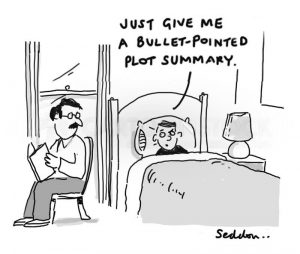
[CartoonStock]
Now, you’ll want to summarise!
Summarising means to create an overview of what you’re writing. You want to simplify your ideas here. This means you’ll be reducing or condensing a text to its most important ideas.
Cut the “Fat” from your words, and leave details, examples and formalities.
This allows you to find and eliminate awkward and unnecessary words strung in a sentence.
Here is how you do it:
- Start with actively reading a short text.
- Highlight the main points.
- Reread the text and note down what the main points mean.
- Rewrite the notes in your own words in as few words as possible.
Improve Readability: Sentence Structure
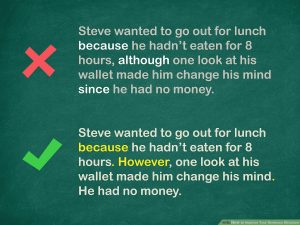
[wikiHow]
The next step will be to broaden the scope of words that you’ll be changing. This time, you’ll want to change whole phrases and sentences. Remember that overcomplicating your sentences isn’t always a good thing!
The person reading your essay must feel engaged by the flow of the essay. And this flow is determined by your sentence structure!
Now, how do you polish your sentence structure?
Use Connector Words and Phrases
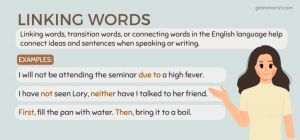
[Grammarist]
Introduce professional-sounding terms in order to structure your essays well!
Sharing Examples: If you want to start listing off things as an example, you can use the following phrases.
For instance…
To give an illustration…
To expand more on…
Giving Importance: Sometimes, you just want your readers to hone in on certain points in your essay.
This highlights the idea/fact that…
Significantly/notably/Importantly…
There is a strong emphasis towards…
Showing Agreement: Sometimes, you want to reinforce the ideas presented that show agreement.
Notwithstanding/Nevertheless/Nonetheless/Despite this/In spite of this…
With this in mind…
In view of/In light of…
In addition to…
There is evidence that supports…
Showing Contrast: And sometimes, you want to share the negatives to a point you’ve raised.
A counterpoint to this argument would be…
However…
Yet…
By contrast…
On the other hand…
Then again…
Having said that…
That said…
Closing off with a Summary: Close to the end of your essay, a summary is a highlight and or a reflection of the essay. It’s a TL;DR for people who have perhaps skipped to the end just to have the information condensed into a quick synopsis.
In conclusion…
In essence…
All things considered…
Ultimately…
Above all…
In other words…
Increase Credibility Through References: Citations and Quotations
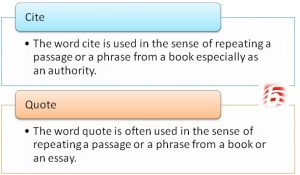
Finally, we introduce you to one of the staples of essay writing: Quotations!
A quotation is simply a way for you to reproduce spoken or written words elsewhere. Quotations can feel similar to paraphrasing. It allows you to provide strong evidence, act as a ‘voice of reason’ and is often used to support your own words.
When used correctly, quotations can become a powerful tool alongside paraphrasing opportunities! Here are some things to take note of when using quotations:
- Follow Your School’s Citation Style – APA? MLA, or something else?
- Match the source word for word – Reproduce the text, including punctuation and capital letters.
- Use only a brief segment of the text – Take only what is needed!
- Text must appear between quotation marks – (“ “)
- Text must be attributed to the original source – Give credit to where you’ve found the text.
The Art of Essay Writing

[Freepik]
Mastering the art of paraphrasing can definitely make a difference in your writing skills. When you’ve gotten a hang of it, you’ll be able to see your essays flow smoothly with flair and originality!
But do remember that paraphrasing is not just about “changing words”. When you paraphrase, you’re reimagining the ideas you’ve already written into an eloquent piece of academic writing.
You’re not just paraphrasing to wow your readers. You’re doing it so that you’ll continue to improve essay writing, allowing you to appreciate and love the language much more than you do now!
English can be a complex language, so take steps to challenge it, understand it, and conquer it!
With that, we wish you good luck with writing!
